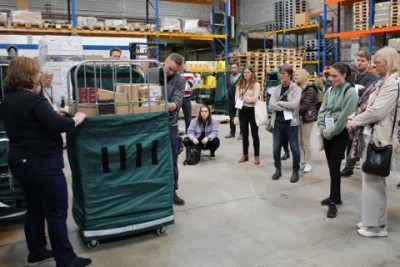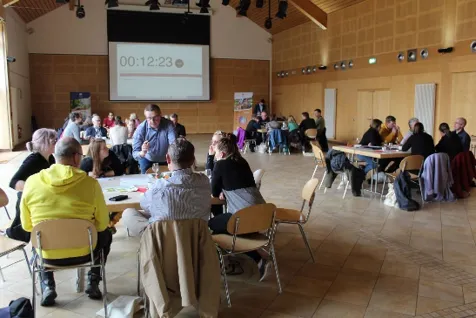General information
RDP Priority
- P6. Social inclusion and local development
RDP Focus Area
- 6B: Local development
RDP Measure
- M19: LEADER/CLLD
Beneficiary type
- Local Action Group
Summary
The CIRCLE project operationalised the concept of a circular economy for SMEs, citizens and municipalities across four LEADER regions. The transnational cooperation project, implemented by the Natur- & Geopark Mëllerdall from Luxembourg in cooperation with the LEADER regions Kantri ry (Finland), Skane Ess and Sydöstra Skåne (Sweden), managed to bring relevant stakeholders together to foster a better understanding of approaches and opportunities for the development of the economy of the future.
The CIRCLE project promoted the simplification of the circular economy concept: providing answers to concrete problems through advice, networking and learning opportunities. In conjunction with project visits, the activities contributed to the creation of new knowledge networks and capacity development across the four LEADER regions.
Results
- Eight SMEs interested in circular economy practices received, through tailor-made consultations, an analysis of their production cycles. These efforts resulted in 20 concrete recommendations for integrating sustainable practices.
- Matchmaking between complementary SMEs from the four participating LEADER regions fostered mutual learning. Through visits to good practice projects, conferences and webinars, these SMEs established collaborations that continued beyond the project's conclusion.

Promoter
Natur- & Geopark Mëllerdall
Funding
RDP support: 49 973 (EUR) Cotribution of Natur- & Geopark Mëllerdall
EAFRD: 29 984 (EUR)
National/Regional: 19 989 (EUR)
Resources
Context
The circular economy is well-known as a concept. However, there are only a few concrete examples of its successful implementation going beyond recycling. Capacity building, knowledge sharing and exchange are suitable means of breaking down this complex concept into relatable terms and applicable actions that lead to tangible improvements across the three pillars of the sustainability model: fostering the environmental, social and economic transition.
The CIRCLE project brought together stakeholders from four LEADER regions from Finland, Sweden and Luxembourg to enable a simplification of the circular economy concept through practical application. The project provided lifelong learning and qualification activities for private and public decision-makers and consumers; matchmaking between SMEs in complementary sectors to learn from one another; and a counselling/consultancy service for firms, helping them make their production cycles more circular.
Objectives
The project aims were to:
- Support the simplification of the circular economy concept in order to provide answers to concrete problems, through advice, networking and learning opportunities.
- Transfer knowledge on the topic of the circular economy and demonstrate implementation examples for companies in the region.
- Create new knowledge networks and develop capacity across the four LEADER regions.
Activities
Project activities included:
- organising information events for local businesses and communities;
- organising training courses;
- conducting circular economy analyses for companies;
- preparing a brochure to promote the circular economy;
- organising three conferences in Sweden (October 2021), Luxembourg (March 2022) and Finland (June 2022); and
- preparing a brochure for publication with examples of best practice from all partner regions, providing ideas and guidance to interested SMEs.
Main results
- The project activities contributed to the creation of a shared language and consensus about the circular economy. The provision of new learning opportunities facilitated and accelerated the transition towards a more circular economic model in the future.
- Eight interested SMEs benefited from an analysis of their production cycles and tailor-made consultations concerning their potential to be part of the circular economy, resulting in 20 concrete recommendations.
- Furthermore, matchmaking between complementary SMEs from the four participating LEADER regions allowed for shared learning during the field visits to good practice projects, as well as at conferences and webinars. The cooperation between the project’s SME participants continues beyond the project activities.
Key lessons
- The beginning phase of the networking activities coincided with the start of the COVID-19 pandemic in 2020. Consequently, the project had to be adjusted, but despite this, the project stakeholders and LEADER management demonstrated high flexibility and organised most activities online when travel was not possible. This enabled the project to achieve its planned objectives despite the difficulties encountered.
Through CIRCLE, like-minded businesses across three European countries were brought together. The project created a dynamic cross-border network for exchanging ideas and good practices and planting the seeds for circular thinking in each region.
Natur- & Geopark Mëllerdall

